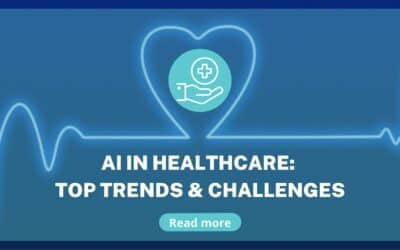Dr. Arnaud Rosier, the co-founder of Implicity®, discusses how artificial intelligence can impact healthcare.
Last fall, Implicity received clearance from the Food and Drug Administration for a novel AI algorithm that analyzes ECG data from Implantable Loop Recorders (ILRs). The company, started in 2016, already offered solutions to harness and unify clinical data from remote patient monitoring. But artificial intelligence has the potential to be a game changer – not just for Implicity, but for the healthcare industry as a whole.
Here, Implicity co-founder Dr. Arnaud Rosier answers some of the most pressing questions about the potential for AI to transform healthcare.
Q: What are the biggest drivers of AI in healthcare?
A: Ten years ago, remote monitoring of pacemakers and defibrillators existed, but it was a very small, niche use case. Today, there is a huge trend toward connecting every implantable device. So, you have more data than ever being collected in healthcare, and much of this patient data is getting pushed out to third-party cloud environments. Artificial intelligence is going to be needed in the healthcare space to analyze this data in real-time to help support clinical workflows and improve outcomes for patients. In other ways, the strongest drivers are digitalization and the shortage of expert human resources.
Q: How effective are today’s AI-powered healthcare solutions?
A: There was a study published in the European Heart Journal that looked at our AI tool. It’s called ILR ECG Analyzer, and it’s an AI-based medical algorithm designed to flag and remove false positives for heart patients implanted with an ILR who are being monitored remotely. That study determined that our algorithm reduces the rate of false positives by 79 percent, while still maintaining 99 percent sensitivity. Overall, the algorithm was able to reclassify 1,200 out of more than 2,800 alerts as “normal” events, meaning that clinicians were able to redirect their time and attention to patients who genuinely needed interventions. Of course, that’s just one recent example, but in many use cases, we see now FDA-cleared products that can perform better than healthcare professionals on specific tasks.
Q: What are some of the greatest challenges facing healthcare organizations as they look to implement AI solutions?
A: I mentioned before how pervasive remote monitoring is becoming. Previously, most remote monitoring devices pushed out data to proprietary hardware. But increasingly, smartphone apps are collecting patient data and sending it out to the public cloud. So, hospitals and clinics have this wealth of data, but often it’s sitting in a number of different places outside the walls of their organizations, being stored and managed by third parties. To successfully run analytics on this data, healthcare providers first need to bring it all into one unified environment through the use of a data management platform.
Q: What should we expect to see happening with AI in healthcare over the next several years?
A: A lot of the activity is going to be around the adoption and expansion of technologies that are still emerging, especially remote monitoring. Physicians are waking up to the fact that they simply need to offer remote monitoring because it decreases mortality, but they have a hard time scaling their programs. So, we’re going to see more use of remote monitoring for implantable devices like pacemakers, and then wearable devices like weight scales and blood pressure monitors. But for patients to adopt these wearable devices, they need to know that some healthcare professional reviewing the data, and that’s just impossible to scale without the use of AI .
Q: Most remote patient monitoring solutions seem to be geared around a specific diagnosis. Will AI solutions eventually be able to use that same data to “treat the whole patient”?
A: I think they will. The way the data is produced is not what matters. And who gets the data first doesn’t matter, either. What matters is what the data speaks about, and who can make value of it for patients. The answer to that is going to include other physicians, of course, and to some degree patients themselves. In the U.S., there was a law passed several years ago that prohibits vendors from blocking health data from providers. That law was aimed at electronic health record systems, but it applies to remote monitoring, as well. So, we should start to see more data sharing and collaboration in the coming years, and when that happens, AI solutions will have access to far more information that leads to insights about patient health.
Q: Aside from improvements to patient care, what are some potential benefits of AI for healthcare systems and providers?
A: We’re hoping to see artificial intelligence reduce burnout among clinicians. Job burnout is a huge issue in healthcare, especially for cardiologists. They’re working long hours, and they put themselves under enormous pressure to be perfect in their work, because it can mean the difference between life and death for their patients. There’s a 2020 report from McKinsey that talks about how AI can improve life for practitioners because it lets them spend more time looking after their patients. And then, as a result, you see improved retention and staff morale. So, as the industry adopts AI more widely, that’s one of the big benefits that we’re hoping will play out.

